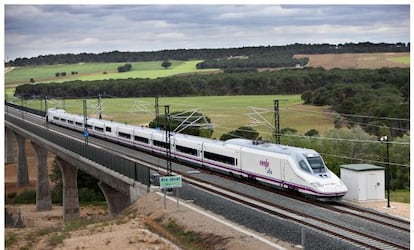High-speed link to nowhere
Spain to continue with Badajoz line despite Portugal abandoning Madrid-Lisbon connection Government has so far spent only nine percent of budget for project

Spain has decided to continue with its leg of the planned Madrid-Lisbon high-speed train link despite the decision last week of the government of Portuguese Prime Minister Pedro Passos Coelho to abandon the project.
On the same day that Portugal decided to wash its hands of a high-speed connection to the Spanish border, Public Works Minister Ana Pastor said that Spain would push ahead with its plans to extend its high-speed network to the southwestern cities of Cáceres and Badajoz, which have a combined population of just 250,000. Ministry sources, however, say there is no fixed schedule for completing the work
Of the 4.73 billion euros budgeted by the Spanish government for the link, only 419 million has been spent so far, just nine percent. Experts argue that this is a good reason to revisit the pros and cons of the line to Extremadura now that Portugal has pulled out of the Madrid-Lisbon project.
“It is obvious that we have to stop and rethink more modest and well-thought-out options for modernizing this line,” says University of Barcelona professor Germà Bel. “The construction of a high-speed line between Madrid and Badajoz would do heavy economic and social harm to all Spaniards just as the other high-speed lines have in a country with far too low demand.
Would we be happy to do the journey in two hours if it weren’t so expensive”
“The obsession with linking Madrid to all the provincial capitals is absurd, as it will mortgage the lives of people today and future generations, who do not deserve such an ideological and nationalist infrastructure policy that is so divorced from the criteria of productivity and the welfare of people,” continues Bel, who is the author of the book España, capital París.
The chairman of the College of Engineers, Edelmiro Rúa, advocates that work should continue on the Madrid-Badajoz line, but insists that ways must be found to make infrastructure built using taxpayers money profitable.
“The truth is that a high-speed train that goes at 350 kilometers an hour is not profitable, but one that goes at 200 km/h is,” he says. “That is why we have to change the lines we have, which have become outmoded.
“We’re delighted to be able to travel between Madrid and Valencia in 90 minutes,” he continues. “But we need to ask whether we would be happy to do the journey in two hours if it weren’t so expensive.”
The European Union commissioner for transport, Slim Kallas, agrees that it does not make much economic sense to build a high-speed link to Lisbon.
Spain’s regions, however, are understandably keen to fight to get modern infrastructure. “The Extremeño government wants its high-speed link, and that is why it will continue to carry out the work that has been planned,” says Víctor del Moral, the public works commissioner of the region, adding that the regional budget for this year will show amounts earmarked for the Madrid-Badajoz line.
Pastor is shortly to meet with her counterparts in the French and Portuguese governments. She said she felt greatly reassured by Portuguese Economy, Labor, Transport and Public Works Minister Álvaro Santos Pereira’s remarks that despite abandoning the Madrid-Lisbon project, Portugal would still use the same rail gauge as the rest of Europe. “That is the most important thing for us,” Pastor said.
Tu suscripción se está usando en otro dispositivo
¿Quieres añadir otro usuario a tu suscripción?
Si continúas leyendo en este dispositivo, no se podrá leer en el otro.
FlechaTu suscripción se está usando en otro dispositivo y solo puedes acceder a EL PAÍS desde un dispositivo a la vez.
Si quieres compartir tu cuenta, cambia tu suscripción a la modalidad Premium, así podrás añadir otro usuario. Cada uno accederá con su propia cuenta de email, lo que os permitirá personalizar vuestra experiencia en EL PAÍS.
¿Tienes una suscripción de empresa? Accede aquí para contratar más cuentas.
En el caso de no saber quién está usando tu cuenta, te recomendamos cambiar tu contraseña aquí.
Si decides continuar compartiendo tu cuenta, este mensaje se mostrará en tu dispositivo y en el de la otra persona que está usando tu cuenta de forma indefinida, afectando a tu experiencia de lectura. Puedes consultar aquí los términos y condiciones de la suscripción digital.









































